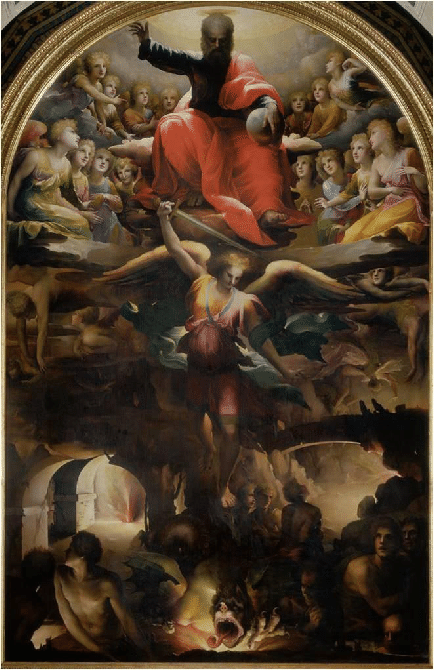My faith in Hollywood and the entertainment industry is not very deep. Leaving God, Christ, and the Holy Spirit aside for the moment (as Hollywood tends to do), the basic facts about angels and demons are not correctly presented. And this, after two thousand years of Christian teaching, ought to have enabled entertainers to get it right. But they fail, constantly.
The “problem” that most tries my patience at the moment is: demons. The ones I have seen in popular entertainment are over-dressed. They are rude and snarling, totally evil in fact; trying to frighten children and the older innocents.
Such demons can never be very successful in this world, or at least they weren’t successful until recently, because they can only seriously scare the mentally disturbed or neurotic.
They are, frankly, quite vulgar, and as much in need of catechetical training as the human population. They may not remember that, for instance, they are descended from angels: a distinguished personal history.
God, after all, does not create demons (as such); or at least He does not do so in the Christian religion. For the angels have or had the mysterious freedom to fall, and so they did at some undetermined point in the pre-historical past. Yet the demons today act as if they were born that way, and as if their attachment to the Father of Lies were something automatic and, as it were, built into nature.
This means that our demons sometimes show a lapse of good taste. They supposedly participate in crimes that, in reality, they have only suggested.
An important distinction may be found in mediaeval accounts of sexual perversion, however. (These days, even listing the various kinds can get one into trouble.) We think of them participating in debauchery; of taking the lead in orgies of depravity; of rampaging through the midst of them.
But I doubt any “Christian” demon would sink so low. His higher birth has, after all, endowed him with some taste and judgement, and he would turn up his nose and perhaps sneer at common scenes of depravity. At the very least, once it was happening, he would try to get away. A true demon would not stick around to the end.
He would, however, with his mischievous wit, put a perverse idea into some human head (or “animal head,” as the demon might put it). For humans were not created as angels, and although we were created by God, we apparently fell harder.
Suffice to say, a demon will tell a human to do something that a demon would never do. And will be disgusted if the human goes off and does it. He can’t help it, he has too much “natural” good taste.

Rarely do we notice the aristocratic habits of the demons. We do not often see the way they are looking down on us. This smaller misconception is part of the grander misunderstanding on which “democracy” is based. We assume the average demon will be just like us. And indeed, the evidence that they also vote in our elections may seem to be irrefutable, for the more demonic party frequently wins.
However, this is an illusion. The demons may tell the human to vote Democrat or Liberal or whatever, but all the while, the demon himself knows better. Of course, the prospect of what will happen after the humans have obeyed him may be deliciously attractive to the Fathers of Lies. They may boast to each other about how they have set the humans up.
But they flinch even when they observe their own successes. They were just, so to say, joking; but the humorless humans – what a mess!
Bankers and medical doctors make jokes like that, and smile among themselves, but bankers do not really enjoy a bankruptcy, nor doctors a seizure or cardiac arrest. In this sense, they are just like demons.
I think the best way to understand demons is by analogy to intellectuals. You may deal with them; listen to their advice; imagine the consequences. But you would be a fool to actually do what you have been told by an intellectual.
Note, that this is not because the intellectual is stupid. The truth is, he may actually have a higher IQ than the average, or have mastered vocabulary that will make him shine. I remember the first time a normally well-wishing friend observed, about me, that “For such a reputedly smart person, you sure are a moron.”
After years of confirming this moronic behavior, I have come to see that the observation was not a paradox, or less than it seemed at the time. For that “smart” characteristic is all mere display, and the more one tries to display it, the more its absence is revealed.
Something like that must afflict the demons, too. They are all display, and the first thing about them that we can notice is what they are trying to conceal; their pride for instance. The more accomplished demons go as far as to hide their very existence, but not many demons operate on this level of craftsmanship. Most give themselves away, the moment we squint our eyes.
That is why, in the Middle Ages, when Catholic Christianity was a lot more secure at all levels of society in most Western countries, people were in the habit of laughing at their devils. This is easy to understand, once we realize that the pretensions of the demons can be genuinely funny.
In a sense, this was a sadistic behavior. The demons are proud, extremely proud in ways that unfallen angels cannot be, and it hurts them most acutely to be mocked. That is why they have now put so much effort into “political correctness,” or “wokeism.” They want to induce the humans to police themselves, and stop making such cruel sports of them.
We should try to make up for our flaws, as morons, by laughing at them heartily.
*Image: Saint Michael Defeats the Rebel Angels by Domenico Beccafumi, c. 1524 [Pinacoteca Nazionale di Siena]
You may also enjoy:
St. Thomas Aquinas’ Aquinas on Demons
Steven P. White’s The Nature of Our ‘Angels’















